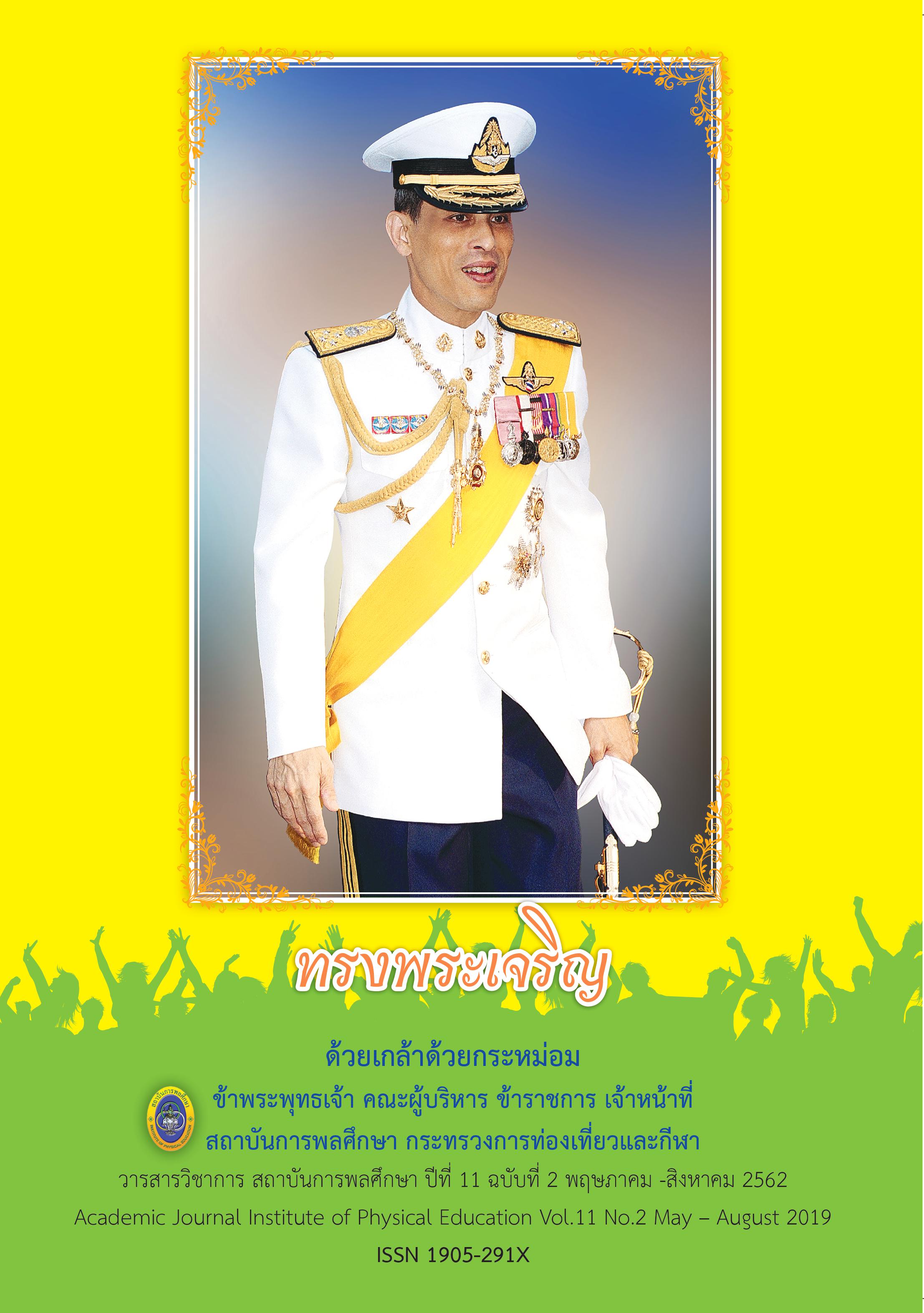FACTORS INFLUENCING ON SUPPORTING THE PHILOSOPHY OF SUFFICIENCY ECONOMY PROJECTS OF SCHOOLS IN THE RAYONG PRIMARY EDCATIONAL SERVICE AREA OFFICE 2
Main Article Content
Abstract
The purposes of this research were to study the factors influencing on the supporting the Philosophy of Sufficiency Economy projects of schools in the Rayong Primary Educa tional Service Area Office 2. The factors in this study were: 1) academic administration; 2) budget administration; 3) personnel administration; 4) general affairs administration; and 5) educational participation. The 354 samples consisting of 63 school directors and deputy school directors and 291 teachers, were selected by multistage sampling technique. The instruments used for collecting the data was a five- scale rating questionnaire. The item reliability of the questionnaire was found between 0.33- 0.89 and the reliability of the whole questionnaire was 0.98. The statistics used for data analysis were arithmetic mean, frequency, standard deviation, Pearson product moment correlation coefficient and Stepwise multiple regression analysis. The research findings were as follows:
1. The factors influencing on the supporting the Philosophy of Sufficiency Economy projects of schools in the Rayong Primary Educational Service Area Office 2 were found at a high level ranking in desconding order: 1) educational participation; 2) academic administration; 3) personnel administration; and 4) budget administration. However the general affairs administration was found at a highest level.
2. The factors that correlated the supporting the Philosophy of Sufficiency Economy projects of schools in the Rayong Primary Educational Service Area Office 2 comprised academic administration, personnel administration, budget administration, general affairs administration and educational participation. They were positive correlated with statistically significance at 0.01
3. The factors that were able to predict the supporting the Philosophy of Sufficiency Economy projects of schools in the Rayong Primary Educational Service Area Office 2 comprised personnel administration (), educational participation (
), general affairs administration (
), academic administration (
) and budget administration(
). All factors were able to predict the supporting the Philosophy of Sufficiency Economy projects as a whole at 86.5 percent withthe significant difference of p< 0.01 The raw data equation was shown as follows:
Ŷ = 6.438 + .228() + .255(
) + .222(
) + .177(
) + .140(
)
Article Details
The published article is a copyright of the Academic Journal of Thailand National Sports University. The passage appeared in each article in this academic journal is a perspective of each author which is not related to the journal. Each author is required to be responsible for all components of his/her own article. If there are any mistakes, each author must be responsible for those mistakes on his/her own.
References
Charoenrat, R. (2008). Change management and effectiveness of academic administration in pilot schools of change agent under the offices of Nakhon Phanom educational service area. Master of education program thesis, Department of Educational Administration, Sakon Nakhon Rajabhat University. [in Thai].
Chuaytrakul, D. (2008). Risk management in basic educational institutions. Dissertation, Doctor of Philosophy, Department of Educational Administration, Graduate School, Silpakorn University. [in Thai].
Cronbach, L.J. (1990). Essentials of Psychological Testing. 5th ed. New York: Harper & Row.
Kerdkhum, K. (2009). The achievement of the policy of the sufficiency economy of Ban Sun Ti Suk Moo 5, Mae La Luang Sub-district, Mae La Noi District, Mae Hong Son Province. Independent study, Master’s degree, Department of Public Administration, Chiang Mai University. [in Thai].
Krejcie, R.V. & Morgan, D.W. (1970). Determining Sample size for Research activities. Educational and Psychological Measurement, 30(3), 607-610.
Ministry of Education. (2007). A handbook of the basic education institutions administration as juristic person. Bangkok: Express Transportation Organization of Thailand. [in Thai].
Ministry of Education. (2007). A guideline for taking the philosophy of sufficiency economy applied in educational management in educational institutions. Documents for the administrative committee meeting of driving the philosophy of sufficiency economy to schools project. Bangkok: The Central Coordinating Center for Operating underthe Royal Initiative. [in Thai].
Office of the Sufficiency Economy Movement Subcommittee. (2007). 5th Words collection from the royal guidance of His Majesty the king Bhumibol Adulyadaj since 1950-2006 related to sufficiency economy philosophy. Bangkok: Office of the National Economic and Social Development Board. [in Thai].
Office of Rayong Primary Educational Service Area 2. (2012). A lesson learned from sufficiency educational institutions year 2012 “story of sufficient people”.
Rayong: Office of Rayong Primary Educational Service Area 2. [in Thai].
Pannawong, S. (2008). The management of basic education schools according to the philosophy of sufficiency economy of Ban Nawa Pittayakom school under the
office of Nakhon Phanom primary educational service area 2. Master of education program thesis, Department of Educational Administration, Ubon Ratchathani Rajabhat University. [in Thai].
Parnprom, V. (2008). The effectiveness of educational administration in accordance with the philosophy of the sufficiency economy in the leading moral schools Under the office of Sakon Nakhon educational service area 1. Master of Education program thesis, Department of Educational Administration, Sakon Nakhon Rajabhat University. [in Thai].
Pichayamahoot, N., & Lapsomboondee, A. (2014). An application of sufficiency economy in household economic problem solving. Case study: Ban Nong Kok Village, Thap Rat Sub District, Ta Phraya District, Saraburi Province, Rajamagala University of Technology Lanna Journal, 126-140. [in Thai].
Ploy Wan, P. (2010). Sufficiency economy driving movement processes in private sector businesses : a multiple case study analysis. Bangkok : Chulalongkorn University. [in Thai].
Saengsuwan, N. (2012). A success of the philosophy of sufficiency economy movement in sufficiency economy village prototype in Chiang Mai province. Master of Arts’ thesis, Department of Man and Environment Management, Graduate School, Chiang Mai Univeristy. [in Thai].
Sukhothai Thammathirat Open University. (2004). Quantitative analysis for economists unit 12-15. Nonthaburi : Sukhothai Thammathirat Open University. [in Thai].
Thiputai, R. (2011). The implementation of the philosophy of sufficiency economy into basic education schools under Suphanburi Primary Educational Service Area Office 2. Master of education program thesis, Silpakorn University. [in Thai].
Tanai, K. (2008). Inducing the royal initiate of sufficincy economy to school performances of Banterdthai Amphoe Maefaluang Chiangrai Province. Independent Study of Master of Education. Rajabhat Chiangrai University.


